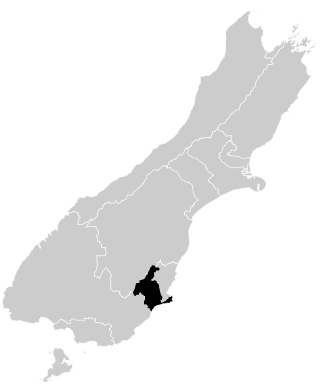
The 1978 New Zealand general election was a nationwide vote to elect the 39th New Zealand Parliament. It saw the governing National Party, led by Robert Muldoon, retain office, but the opposition Labour Party won the largest share of the vote. Reorganisation of the enrolment system caused major problems with the electoral rolls, which left a legacy of unreliable information about voting levels in this election.

The 1972 New Zealand general election was held on 25 November to elect MPs to the 37th session of the New Zealand Parliament. The Labour Party, led by Norman Kirk, defeated the governing National Party.

Clutha-Southland was a parliamentary constituency returning one member to the New Zealand House of Representatives. The last MP for Clutha Southland was Hamish Walker of the National Party. He held the seat for one term, being elected at the 2017 general election and representing the electorate until the 2020 general election where he retired from Parliament, and the seat was replaced with the Southland electorate.

Dunedin North is a former New Zealand parliamentary electorate, which returned one Member of Parliament (MP) to the New Zealand House of Representatives. It was established for the 1905 election and has existed since. It was last held by David Clark of the New Zealand Labour Party, who replaced the long-standing representative Pete Hodgson. It was considered a safe Labour seat, with Labour holding the seat for all but one term (1975–1978) since 1928. In the 2020 electoral boundary review, Otago Peninsula was added to the area to address a population quota shortfall; with this change the electorate was succeeded by the Dunedin electorate in the 2020 election.

Dunedin South is a former New Zealand parliamentary electorate. It first existed from 1881 to 1890, and subsequently from 1905 to 1946. In 1996, the electorate was re-established for the introduction of MMP, before being abolished in 2020.

Waitaki is an electorate for the New Zealand House of Representatives that crosses the boundary of North Otago and South Canterbury towns on the East Coast of the South Island. The electorate was first established for the 1871 election that determined the 5th New Zealand Parliament. It has been abolished and re-established several times and in its early years was a two-member electorate for two parliamentary terms. The current electorate has existed since the 2008 election and is held by Miles Anderson of the National Party.
Clutha was a New Zealand parliamentary electorate from 1866 to 1996.
St Kilda is a former New Zealand parliamentary electorate. It existed from 1946 to 1996 and was represented by four Members of Parliament.
South Canterbury is a former parliamentary electorate, in South Canterbury, New Zealand. It existed for three parliamentary terms from 1969 to 1978.
Dunedin West was a New Zealand parliamentary electorate, in the city of Dunedin. It existed for three periods between 1881 and 1996 and was represented by seven Members of Parliament.
Tuapeka is a former parliamentary electorate in the Otago region of New Zealand, from 1871 to 1911.
Bruce was a rural parliamentary electorate in the Otago region of New Zealand, from 1861 to 1922. For part of the 1860s with the influx to Otago of gold-miners it was a multi-member constituency with two members.
Chalmers, originally Port Chalmers, was a parliamentary electorate in the Otago Region of New Zealand, from 1866 to 1938 with a break from 1896 to 1902. It was named after the town of Port Chalmers, the main port of Dunedin and Otago.
Mornington is a former parliamentary electorate from 1946 to 1963, centred on the suburb of Mornington in the city of Dunedin, New Zealand.
Moeraki was a parliamentary electorate in the Otago region of New Zealand, from 1881 to 1887.
Taieri is a parliamentary electorate in the Otago region of New Zealand, initially from 1866 to 1911, and was later recreated during the 2019/20 electoral redistribution ahead of the 2020 election.
Otago Central or Central Otago was a parliamentary electorate in the Otago region of New Zealand, from 1911 to 1919 as Otago Central; from 1928 to 1957 as Central Otago; and from 1957 to 1978 as Otago Central. It was replaced by the Otago electorate. The electorate was represented by six Members of Parliament.
Dunedin Suburbs is a former parliamentary electorate in the city of Dunedin in Otago, New Zealand from 1890 to 1893. The electorate was represented by one Member of Parliament, William Dawson, representing the Liberal Party.
Roslyn was a parliamentary electorate in the city of Dunedin in the Otago region of New Zealand from 1866 to 1890.
The 8th New Zealand Parliament was a term of the New Zealand Parliament.





